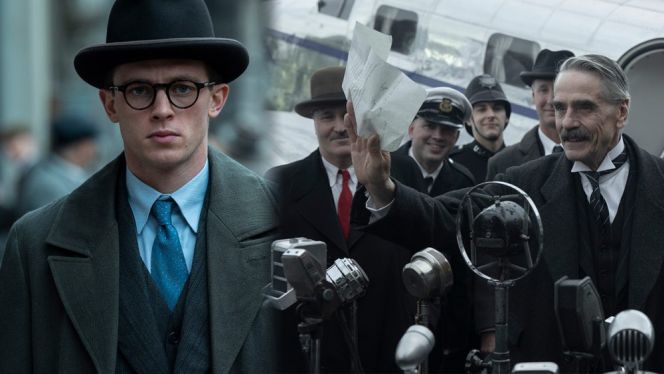MOVIE REVIEW – In Munich, two young men: an English diplomat and a German spy and conspirator try to prevent World War II in an interesting yet overly restrained thriller. The film, about the Munich Convention, which is partly fictional, tries to provide excitement, but unfortunately, it is focused on a too-familiar historical outcome.
The last time we saw George MacKay running, he was sprinting at full speed on the battlefield of the First World War. In 1917, the British actor played a soldier tasked with delivering that an imminent offensive was doomed to failure.
In Munich – On the brink of war, it’s 1938, and the setting is London, then Munich, but MacKay is once again carrying urgent messages that sometimes send him running through the streets of the city – for example, to deliver news of Germany’s latest action against Czechoslovakia to Prime Minister Neville Chamberlain (Jeremy Irons).
The “prelude” to World War II
We are not yet immersed in the turmoil of war, as in “1917”, but in the period leading up to it. Time has moved forward two decades, but MacKay is once again a tiny player in a great drama, desperately trying to prevent the inevitable catastrophe. As Hugh Legat, MacKay plays a recent Oxford graduate and Chamberlain’s private secretary. In London, Legat watches for ominous signs of a gathering storm – a deflated balloon on a building – while witnessing the personal affairs of a prime minister who is trying to keep Hitler at bay.
The resulting historical drama is inevitably robbed of suspense and sufficient excitement because we know exactly what happened next, although it is still quite exciting at the moment. Based on a novel by Robert Harris, a writer specialising in war fiction, the film’s taut yet somewhat sterile tone is offset by well-developed period detail.
Although Munich is a historical spy film in its genre, it has little in common with the genre’s classics. It’s a fictional story with fictional protagonists, but the target audience is Netflix viewers interested in history.
Here, MacKay is just figuratively “running.”
For MacKay, meanwhile, “Munich” might seem like an outwardly logical sequel after his breakthrough performance in the war-themed film “1917,” though it’s a surprisingly low-key role for the star. As a stern Whitehall secretary, Hugh Legat, at first working to the rules, becomes embroiled against his will in a life-threatening espionage affair that could affect the fate of humanity. But it is the other protagonist we are more excited about than MacKay. As Paul von Hartman, a young German patriot-turned-secret resistance agent, the excellent Niewöhner (from Schwochow’s other 2021 premiere, Je Suis Karl) plays the more compelling character with a more interesting character arc. Alongside the two of them, Jeremy Irons routinely plays the slightly starchy but decent, but also (almost…) willing to do anything for his country, Prime Minister Neville Chamberlain. We won’t give away much more of the story. Most of it is familiar to history buffs anyway (beyond the prominent global events, of course, because everyone knows about that).
Lengthy exposition, slow-moving events
Although “Munich” unfolds in just over two hours, with ample exposition and later events that are perhaps too “fast-paced” and perhaps clash by the end, it would undoubtedly have been to the film’s advantage if the backstory of Paul’s political turn from Nazi to radical patriot had been more fully developed, as it would have been much more interesting than Hugh’s career/marriage angst, which was thoroughly dragged out, and is very dull and clichéd.
All in all, an interesting, if not overly exciting, historical spy film, the sad outcome we are unfortunately well aware of. The two young protagonists and the older Jeremy Irons are great in their roles, but they can’t save the dullness due to the prolonged exposition and the uninteresting parts. Fortunately, the film picks up considerably later, but this only happens halfway through the two hours and twenty-one minutes. There are too many missed opportunities in this interestingly started historical story.
-BadSector –
Munich: The Edge of War
Direction - 6.8
Actors - 7.2
Story - 6.4
Action/Visuals - 5.8
Ambiance - 6.2
6.5
FAIR
All in all, an interesting, if not overly exciting, historical spy film, the sad outcome we are unfortunately well aware of. The two young protagonists and the older Jeremy Irons are great in their roles, but they can't save the dullness due to the prolonged exposition and the uninteresting parts. Fortunately, the film picks up considerably later, but this only happens halfway through the two hours and twenty-one minutes. There are too many missed opportunities in this interestingly started historical story.


















Leave a Reply